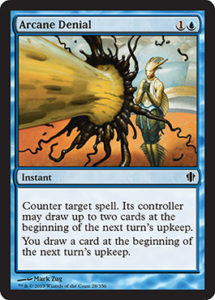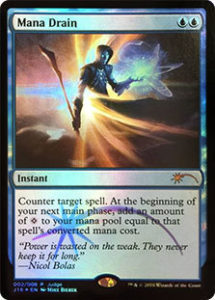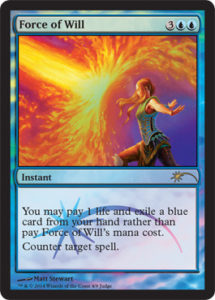Top 16 Blue Cube Counterspells – Part 4 of 4

This week we finish our countdown of the top 16 blue counter spells in cube, with the top 3!

A personal favourite of mine as well as a card somewhat under the radar. Arcane Denial never made much of an impact on constructed formats of the time as it was around at the same time as many of the other strongest counterspells. Additionally it is so old it has never been able to feature in the more current extended and modern formats. As with Force Spike, the powerful and fast paced nature of the cube improves the usefulness of Arcane Denial. You actually lose card advantage by countering one of their spells with Arcane Denial as they get to draw two cards while you only draw one. This can vary from being disastrous to being irrelevant. Fortunately the trend is far closer to the irrelevant end of the spectrum than the disastrous end. If the card you countered is twice the average usefulness of the average draw for that deck then you are ahead. As you get to chose what you counter, you will tend to only counter high value targets so as to minimise the relative drawback. Decks without redundancy are far more vulnerable to the Arcane Denial as far fewer cards will be important at any given time. On the other hand a deck like red deck wins where all the cards are similar in effect and power level you are unlikely to be getting ahead casting the Arcane Denial on their spells. The main reason Arcane Denial is so good is that it helps your deck get to where it wants to be while simultaneously stopping your opponents deck doing exactly what it wants to do regardless of what that might be. Arcane Denial is the cheapest and easiest to cast of all the hard counters without a target restriction and it replaces itself thus helping you continue to curve out and have the appropriate kinds of card you need. Arcane Denial also tends to provide you with a tempo edge, not only is the card cheap and therefore usually answering something of greater cost but it also tends to let you untap and use the card drawn from it before your opponent. Like both Remand and Memory Lapse, Arcane Denial is a powerful tempo disruption tool however unlike both it is also a single card answer to most things as well. I will almost always play Arcane Denial over actual Counterspell if I am more than one colour or I care more about getting to the mid / late game more than I just want to control a game. The thing that pushes Arcane Denial over the top in terms of all round goodness is that you can put it to effective use even against red deck wins where the card disadvantage is too dangerous to use it on their stuff. If you counter one of your own spells then you get both the draw triggers giving you all three cards in the next upkeep. Although not quite two mana to draw three cards as you have play another card costing you some mana and netting you one less card overall it is still a potent card draw spell. Arcane Denial is cheap, reliable, effective in several roles as a counterspell and has added utility as card advantage on top of that. More so than most of the other cards on this list it lets you outplay your opponent as well which is always an indication of good card design

While easily the most abusable and powerful card on the list, in the role of a counterspell it is just Counterspell. I eventually cut Mana Drain from the cube along with the other power cards as I found it not only too powerful but far too random and swingy. At it’s worst it was an awkward Counterspell (real players still take mana burn) however at it’s best you would get to flop a Wurmcoil Engine into play on turn three or four, often with counterspell backup as well. While the cube is all about powerful things, there is the fun kind of power that arises from good play and card synergy, and then there is the not fun kind of power that occasionally gives you free wins. Mana Drain is of the latter form of power. Mana Drain does benefit from complementary deck design, which is basically useful ways to expend an influx of colourless mana, but beyond this it is very good in any kind of deck. Even ramp decks that normally have minimal disruption love a mana Drain because it is also such a powerful accelerator.

When you absolutely positively need to counter that spell, accept no substitute. A hard counter with no target restrictions and two casting modes makes for a lovely combination. The pitch cost is fair and easily supportable without letting you ignore it in deck design. The normal cost is expensive but still functional as a late game answer and stops it from restricting your potential plays. Force of Will is the ultimate in safety, it is not the power of what it does for you when you finally cast it that makes it incredible but all of the things it lets you do with reduced risk because you have it in hand up to that point. Tap out to make a threat, no problem. Cast a main phase draw spell to carry on making lands drops, why not! You can’t even really play around it that effectively. It is always going to be there waiting for the spell you don’t want it to hit. Another way to assess the power of Force of Will relative to other counterspells is to consider how good it is at each turn of the game and then average those powers (you either need to stop at turn 6 or 7 or apply less weighting to the later turns for this to be an effective way to compare cards however I simply like data in graphical form and this is the most appropriate way to do so for countermagic). Force Spike starts off very strong but quickly becomes the weakest. Actual Counterspell flat lines for the first turn then starts to get steadily better from turn two onwards. Force of Will however starts out strong and stays strong as the game goes on, in our graphical form it has the greatest area under its curve! In some matchps the turn one Aether Vial is the scariest play that is most important to stop, in others the seven mana Karn Liberated. On all the various scary important spells to stop, Force of Will offers you the best or near best odds on stopping it. It is a get out of jail free card.
You do have to have sufficient cards to pitch to it which not only means blue cards, but also means cards you can afford to lose. If your only ways to win are a couple of top end blue monsters then you can’t really include all of them in your total options. The same obviously also applies to pieces of a combo. It is cards like Force Spike you are happiest to be pitching as they are only strong within a certain window in the game. The more blue disposable or redundant cards you are playing the better Force of Will is, however it can still be very powerful even with as few as 8 other blue cards to pitch (in a 40 card deck). It is great in control where it gives you great security, it is great in aggro where it offers powerful tempo swings and it is great in combo where it allows you to force through spells and protect combo pieces while also going off at top speed. It offers very little above and beyond being a counterspell but it is the very best at being a counterspell. It is therefore is also one of the best cards there is for allowing you to dictate the flow of a game.
Did i miss your favourite counterspell? Do you think im under or overrating anything? Let me know in the comments below.




